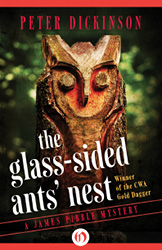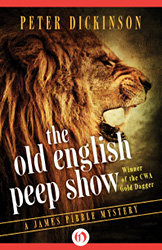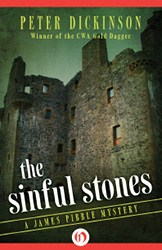One Foot in the Grave (21 page)
Read One Foot in the Grave Online
Authors: Peter Dickinson
12
J
enny's left eye was closed by a bruise which spread as far as her jawbone. She had a plaster across the bridge of her nose and another down her left cheek. She was moving very carefully still, as though not sure what was going to hurt. Pibble knew the feeling well.
“I ought to be nursing you,” he said.
“I'm all right.”
“Why did you come back?”
“I never went. I nearly came in straight away, but I didn't want you to think I was spying on you. I mean, you were probably in the bathroom and that was all. I opened and shut the fire door so that you wouldn't be worried and then I came back to listen. I could just hear your voices, then they stopped and there was a sort of grunting, so ⦔
“He wouldn't have got away with it.”
“No, but you'd have been dead.”
“I suppose so. What brought Lady T?”
“Oh, she'd been waiting all evening to tell me about a grand slam she'd made, and when she heard the fire door and I didn't come, she got impatient and came to look for me.”
“She's been in this morning. She showed me the dent on her frame.”
“I hope it doesn't sound ungrateful, but I don't really like having my life saved. I expect you're used to it.”
“It depends who does it.”
“Exactly.”
She had changed. The bruising and the plasters distracted only for a moment from a deeper alteration. He remembered his picture of her as the bud of a many-petaled flower, full of its own infolded energies. In a surreal slither of images the bud became a clenched fist, a child's round hand clutching its secret, and the secret was that she was afraid. She always had been, but now the tension that had held those small fingers so tight was slackening. She seemed to guess his thought.
“I never knew I could scream like that,” she said musingly.
“No.”
“I enjoyed it.”
“Uh?”
“Well, not at the time, I suppose. I was scared stiffâfor you as well as me. But afterward, when I was lying in bed, waiting to go to sleep, I found I was feeling all jellyfish and cozy and I realized what a lovely scream I'd had. I'm still a bit hoarse, you know.”
“Going to do it more often?”
“No. No, I don't think so ⦠Jimmy, why did Follicleâoh, I suppose I mustn't call him that anymore. Bad taste. But why ⦔
“Don't know. When I was about ten, just after my father died, somebody gave me a penknife. There was a rope handrail up to the organ loft in the chapel my mother joined. Greasy and fat. I started to cut it, and it seemed to flower. Lovely white fresh hemp opening up on both sides of the wound, like the seed head of a dandelion. I couldn't stop. They took my knife away, of course.”
“Just like a man. What's it got to do with Follicle?”
“I don't knowâjust guessing. Consequences of actions. Toby Follick, somehow ⦠treated the world as if actions didn't have consequences. Everything you did was like a conjuring trickâwhen you've done it, that's all, and you go on to the next trick. But it isn't like that. Things have consequences. He kept having to invent new tricks to cope with the results of the one before.”
“Rabbits all over the stage.”
“Yes. Suppose for instance he killed Foster-Banks because he was destroying the setup here, and suppose that he did it because one of the shareholders persuaded him to; after that, somebody in that world would know that Flycatchers was a place in which you could dispose of old relatives in the kindliest possible way. So he'd be asked to do it again. And again. Those were the consequences. Perhaps he realized that he couldn't go on forever; if more and more people knew, it became more and more dangerous, so he invented a new trick. He found out that he could hypnotize Maisie and he programmed her to kill Sir Archibald while he was on holiday. In the end she was going to carry the can for any future disposals, but then he ran into another consequence. Maisie told Tosca. And so on.”
“Nothing ever ended.”
“It doesn't.”
The pause was like a rest on a walk through fogbound fields, a vaguely defined sphere of perception in which no possible ends presented themselves.
“Jimmy?”
“Ur?”
“Why did you go out to the tower?”
“Do myself in. Find an end.”
“Why?”
“Knew I'd never have the nerve again. You'd given me the chance.”
“I see. How did you think I'd react?”
“Unhappy for a bit. Get over it.”
“I suppose so.”
Her hand rose to caress the bruise on her jaw with stubby fingers, exploring the sensation with wary sensuality.
“What are we going to do?”
“Nothing. For the moment.”
“I don't want to stay here. I'm going to start looking for another job.”
“More old vegetables?”
“I don't know. No, I don't think so.”
“I've got to get myself well.”
“Can you do that?”
“If I can't, no one can.”
“You'll have to find somewhere to live.”
“Yes.”
“Mum still hasn't found a tenant.”
“Uh?”
“It's quite nice. She wins prizes for her garden, you know. And the pub's only three minutes away. I think you could afford it. Shall I give her a ring?”
“Uh.”
“OK, that means you've got three days to get yourself well enough for me to drive you over on my day off.”
“Do my best.”
Another of those pauses, only now the mist seemed to be clearing. Not that its vaguenesses were visibly tinged with sun, but still, the walker might feel that if all went well, the day could yet end serene.
“What are we going to say to Lady Treadgold? She's written for a Harrods catalog. Last time she bought a wedding present it was absolutely hideous.”
“What do you think?”
“That's not fair. You first.”
She was looking down at her hands, spreading them wide open, stretched, as though she were trying to will her fingers into further growth.
“Things are a bit different, uh?” he suggested.
Her face didn't change, but he could feel the easing of tension.
“Nothing that happens here is real,” she said slowly. “We'll have to start again if you're at Mum's. I'll see quite a bit of you. I'll have to watch out for Mum, wooing you with clematis cuttings.”
“We can't let Lady Treadgold be right about everything,” he said.
About the Author
P
eter Dickinson was born in Africa but raised and educated in England. From 1952 to 1969 he was on the editorial staff of
Punch
, and since then has earned his living writing fiction of various kinds for children and adults. His books have been published in several languages throughout the world.
The recipient of many awards, Dickinson has been shortlisted nine times for the prestigious Carnegie Medal for children's literature and was the first author to win it twice. The author of twenty-one crime and mystery novels for adults, Dickinson was also the first to win the Gold Dagger Award of the Crime Writers' Association for two books running:
Skin Deep
(1968) and
A Pride of Heroes
(1969).
A collection of Dickinson's poetry,
The Weir
, was published in 2007. His latest book,
In the Palace of the Khans
, was published in 2012 and was nominated for the Carnegie Medal.
Dickinson has served as chairman of the Society of Authors and is a fellow of the Royal Society of Literature. He was made an Officer of the Order of the British Empire in 2009 for services to literature.
All rights reserved, including without limitation the right to reproduce this book or any portion thereof in any form or by any means, whether electronic or mechanical, now known or hereinafter invented, without the express written permission of the publisher.
This is a work of fiction. Names, characters, places, events, and incidents either are the product of the author's imagination or are used fictitiously. Any resemblance to actual persons, living or dead, businesses, companies, events, or locales is entirely coincidental.
Copyright © 1979 by Peter Dickinson
Cover design by Mimi Bark
978-1-5040-0481-7
This edition published in 2015 by Open Road Integrated Media, Inc.
345 Hudson Street
New York, NY 10014


FRESH EBOOK DEALS, DELIVERED DAILY
BE THE FIRST TO KNOW ABOUT
FREE AND DISCOUNTED EBOOKS
NEW DEALS HATCH EVERY DAY
FROM OPEN ROAD MEDIA



